Das ist mir jetzt noch nie geschehen, aber einmal ist immer das erste Mal!
Ich habe mit ein paar wenigen Zutaten eine Sauce fuer frische Nudeln gemacht. Beim Auswerten der Fotos fragte ich meinen Liebsten, wie ich diese Teigwaren nennen soll. Er gab Oliven, Pancetta und Pasta bei Google ein und raus kamen Rezepte der Bucattini all’Aragonese. Und diese Rezepte sind diesem hier fast zum Verwechseln aehnlich!!
Natuerlich wollte ich wissen, was nun Spanien und Aragon mit italienischen Pastarezepten zu tun hat. Und ich fand dies:
Geschichte:
Die Andalusier haben Pasta in die Kuechen Spaniens gebracht. Pasta wurde im 13. JH vorwiegend mit Mehl und Wasser hergestellt, schmale Streifen, Fidawus genannt, Kugeln, Al-Muhammis genannt (man sieht deutlich den arabischen Einfluss), groessere Kugeln, Zazbin genannt und kurze Maccaroni Aletris genannt, wurden hergestellt. Diese Teigwaren wurden damals in der andalusischen Kueche in Rinderbruehe gekocht und mit Pfeffer und Butter serviert.
Es wurden damals uebrigens auch in Aragon Spaghetti hergestellt und zwar ganz aehnlich wie in Italien. Wie bei den Spaghetti all Chitarra, zog man den Teig ueber ein Brett mit Metalldraehten und lagerte dann diese Nudeln in Zinkdosen. (von http://host.fieramilano.it/en/guide-origins-spanish-pasta)
************
This happened to me for the first time!
I bought a few ingredients for a pasta sauce to fresh noodles. When I went through the photos of the dish I asked my hubby, how I should call this dish. He gave the ingredients, olives, Pancetta and pasta into google and out came a recipe for Paste all’Aragonese. The recipe is so very similar to mine, it’s amazing.
Of course I wanted to know why Spain is mentioned in this Italian Pasta recipe. That’s what I found:
History:
Pasta enters the elite kitchens in Spain of the hand of the Andalusians. Pasta recipes are variously made with flour and water and in the thirteenth century: small spindles fidawus, balls al-muhammis, larger balls zabzin and short macaroni aletría. This variety shows a taste for these preparations in fine cuisine Andalusian of the time, were cooked in beef broth and served accompanied by butter and some pepper. Testimonials octogenarians of Aragon and Navarra tell how in the early twentieth century roamed the villages specialists in making noodles; in homes dough of flour and water he is prepared according to the guidelines of the expert, who then made noodles pressing it in carrying grater, then they cut up and stored them in cans zinc. (from http://host.fieramilano.it/en/guide-origins-spanish-pasta)
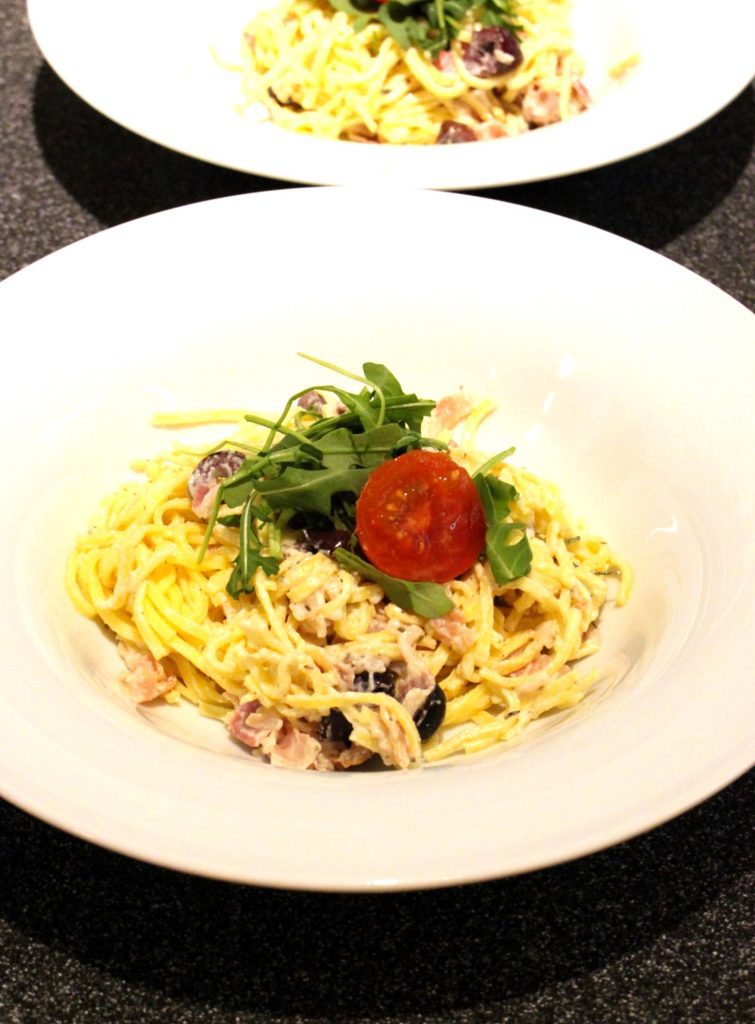
Fuer 2 Personen:
200 g frische Tagliatelle
70 g Spanische schwarze Oliven, entsteint
100 g Pancetta fein geschnitten und gehackt
frischer schwarzer Pfeffer
Rosmarin
200 g Knoblauchfrischkaese
(das Original verlangt Pecorino, aber ich habe eben vom Original nichts gewusst, sondern beim Einkaufen mein eigenes Rezept entworfen)
Die gehackte Pancetta in einer flachen Pfanne knusprig braten, dann die kleingeschnittenen Oliven und den Rosmarin dazu geben. Unterdessen die Tagliatelle nach Packungsanleitung al Dente kochen. 100 ml des Kochwassers zum Speck geben. Die Teigwaren abgiessen und zurueck in die Pfanne geben. Den Knoblauchfrischkaese dazu geben, den Speck mit den Oliven dazu geben. Reichlich Pfeffer dazu reiben und alles sorgfaeltig mischen. Sofort servieren!
************
For 2 Persons:
200 g fresh Tagliatelle
70 g Spanish black Oliven, destoned
100 g Pancetta , chopped
fresh black Pepper
Rosemary
200 g Garlic Cream Cheese
(the original recipe uses Pecorino, but I didn’t know that, as I “invented” my own recipe)
Fry the chopped pancetta until crisp, then add the sliced olives and the rosemary. Meanwhile cook the tagliatelle as advised on the packaging, reserve 100 ml of the cooking liquid and drain them. Add the cooking water to the pancetta and mix well. Put the pasta back into the pan and add the garlic cream cheese and the pancetta and olives. Add black pepper and mix well. Serve immediately!
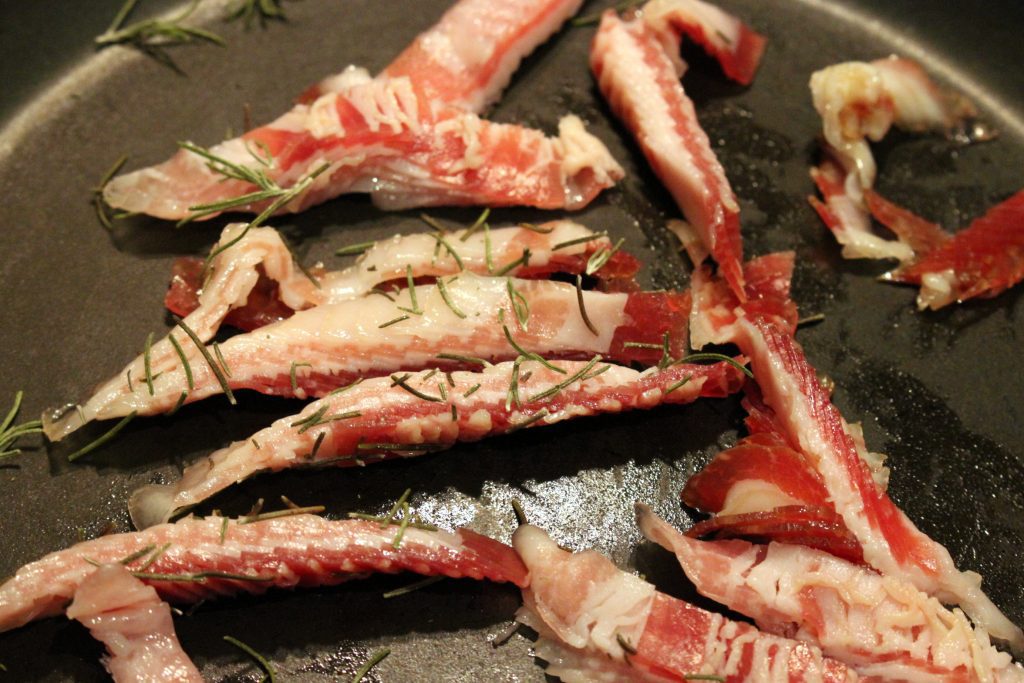
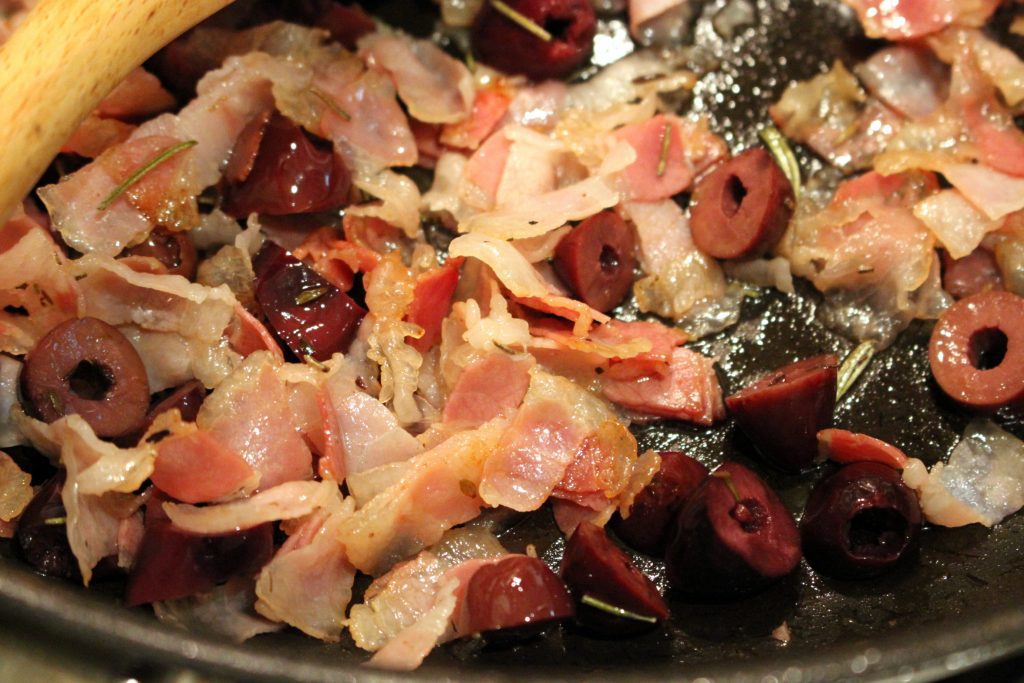
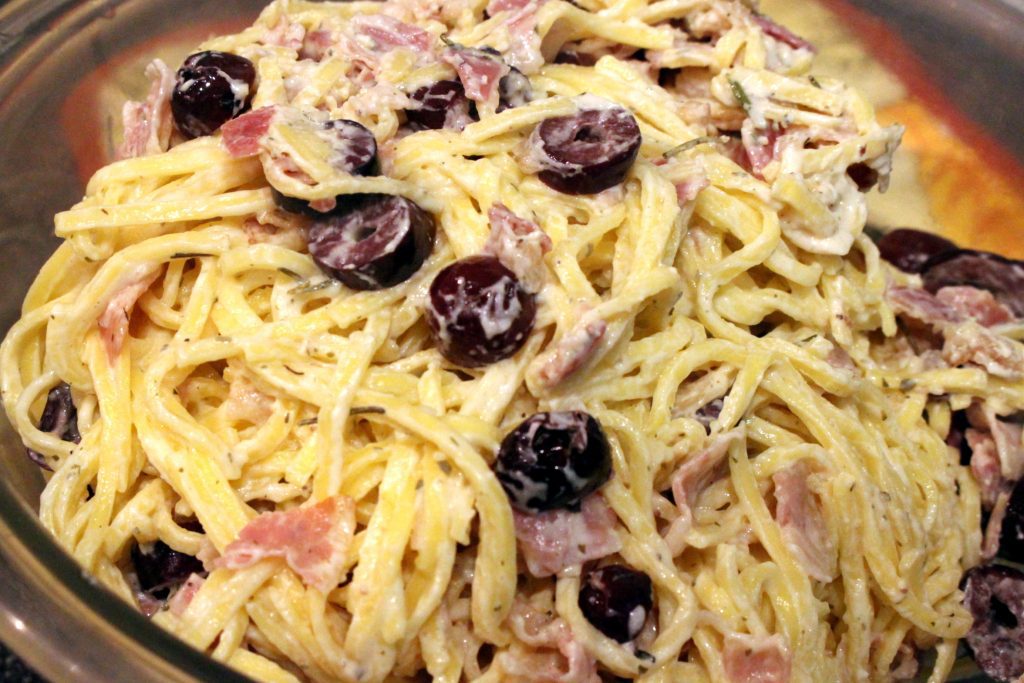
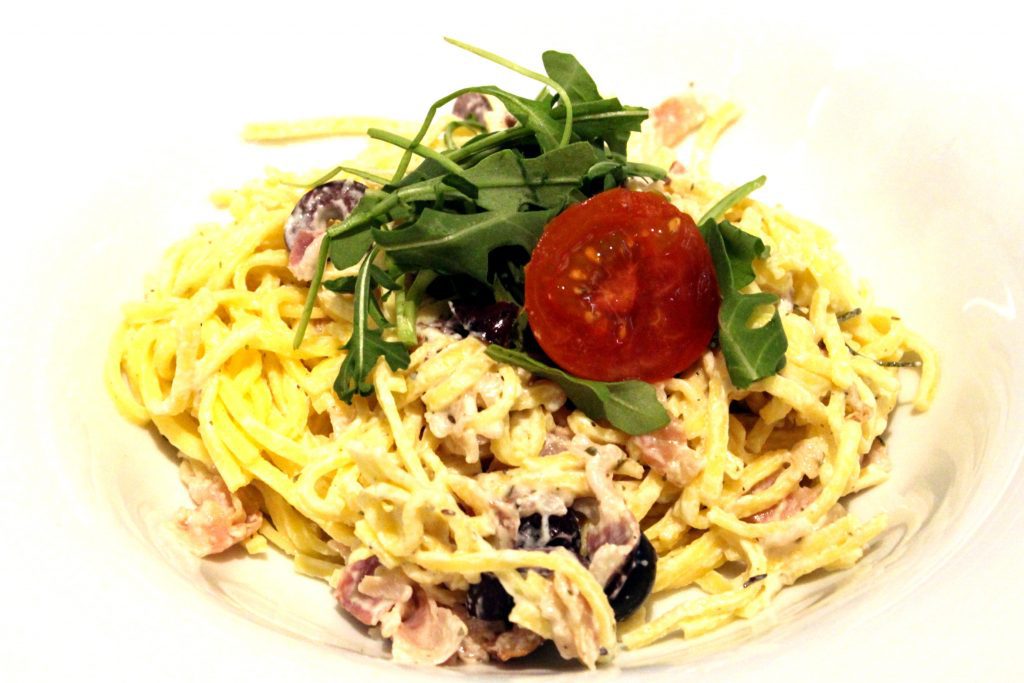
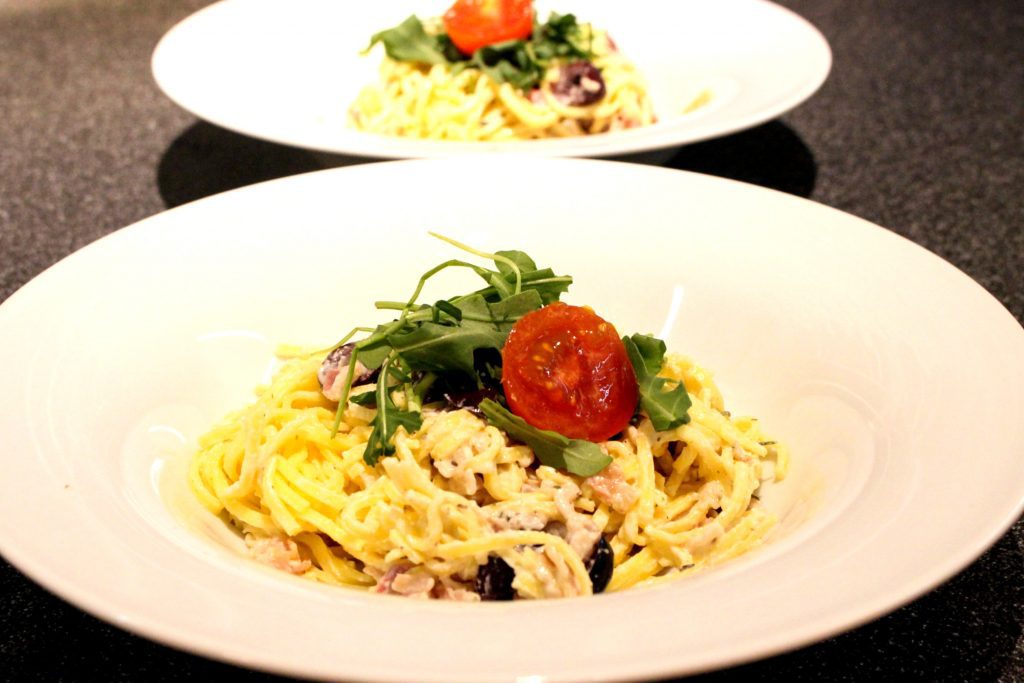
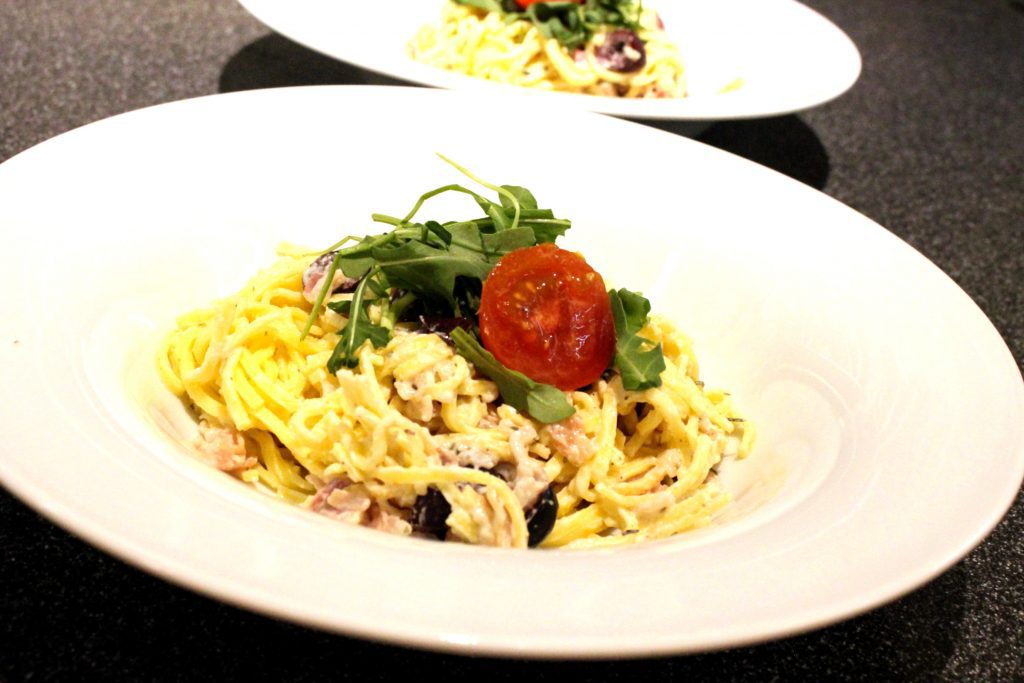
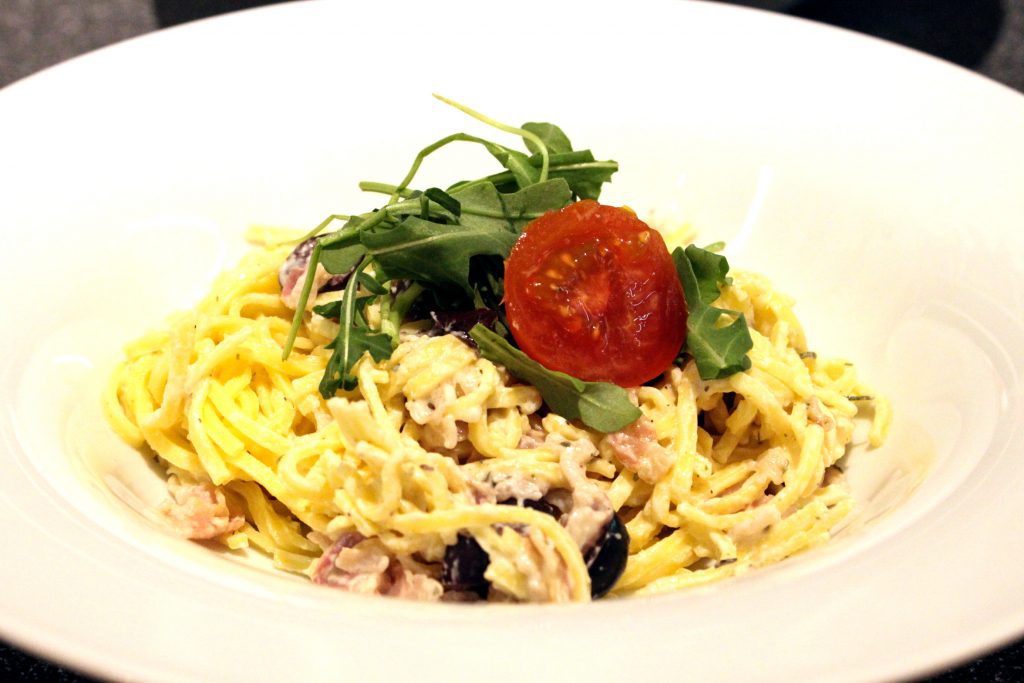





![Validate my RSS feed [Valid RSS]](https://pane-bistecca.com/wp-content/uploads/2024/05/valid-rss-rogers.png)